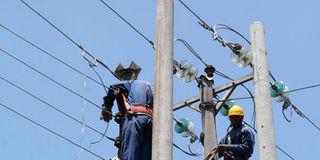Ethiopia plans to double power supplies to Kenya

Kenya Power technicians working on a power line. The onset of heavy rains and filling of dams heralds cheaper bills for consumers.
Ethiopia has written to Kenya indicating that it will double supply of cheaper hydroelectric power to the country following onset of the El Nino rains in the Eastern Africa, which has helped fill dams whose water levels had been reduced by drought.
Kenya has been importing 100 megawatts (MW) of power from Ethiopia which is only half of the 200MW that the two countries inked last year, which is attributed to reduced power output.
Kenya Power Managing Director Joseph Siror on Friday said Ethiopia has now signalled to Kenya that it will start supplying the full 200MW in what will be a major boost to consumers.
“The hydrology in the country has not been very good and this was affecting not only our country but other countries in the region as well. Tanzania has been load shedding while Ethiopia has been unable to give us the 200MW that we signed,” said Mr Siror.
The Kenya Power boss also revealed that Masinga Hydropower Dam has started to fill up, edging the resumption of power generation from the dam closer. The reservoir has not been supplying power to the grid after a biting drought drastically lowered its water levels.
“But the other day we received a letter from Ethiopia saying that they are now ready to give us the 200MW. We are also now getting some nice water inflows into Masinga but as of today we have not started generating,” he said.
Kenya in January started importing cheaper hydroelectric power from Ethiopia for an initial contracted capacity of 200MW, with the capacity to be stepped up to 400MW in three years.
This is after the two countries, through their utilities Kenya Power and Ethiopia Electric Power (EEP), signed a power purchase agreement (PPA) in July last year for $0.065 (Sh10.62) per unit, which is much cheaper than power from independent power producers (IPPs).
Cheaper hydropower from the north will be a major boost for consumers as it will help displace expensive thermal power from the grid. the country had in recent months increasingly resorted to thermal power to plug the generation deficit from hydro and other sources.





